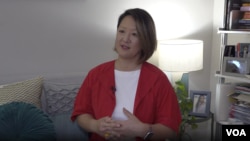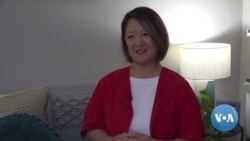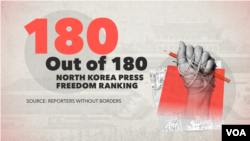When Jean Lee walks into a room, the first place she will often look is up at the corners.
It’s a habit the journalist picked up in North Korea, when she was always on the lookout for listening devices.
Now based in Washington, Lee hasn’t reported regularly from North Korea for years. But old habits die hard.
“I had such an incredible opportunity to learn the mechanism of surveillance and also self-protection in North Korea,” she told VOA. “After I left North Korea, it took a very long time for me to sit still, because I had that sense of paranoia.”
Those idiosyncrasies were ingrained in Lee over three years as the Pyongyang bureau chief for The Associated Press, during which she would stay for about a month at a time. She was the first American to run a bureau inside North Korea.
Lee now co-hosts the BBC podcast “The Lazarus Heist,” which investigates North Korean cybercrime. Although a decade has passed since she set up the AP’s North Korea bureau, she remains one of few journalists who had a regular Pyongyang dateline.
With North Korea’s borders closed since the start of the COVID-19 pandemic, Lee and others say they don’t believe any foreign journalists are left inside the country.
That absence means it’s particularly hard to know what’s going on there, especially when the isolated country is high on the international agenda, including over the case of Travis King, an American soldier who crossed into the country earlier in July.
North Korea’s media landscape is made up exclusively of state propaganda. Pyongyang rarely permits any foreign journalists — let alone Americans — to report from inside the country. That’s what made Lee and the AP bureau unique.
As a U.S. reporter inside the country, she played a crucial role in informing global audiences about North Korea, all while working to give a voice to a people who are often painted over with the heavy brush of party propaganda.
“North Korea is unlike any other country in terms of the lack of access, and the lack of reliable information or inability to build sources on the ground and even outside the country,” Lee said. “You need to be incredibly resourceful, clever, creative, open-minded and strategic if you want to cover North Korea well.”
Part of that strategy was blending in.
Lee learned how to speak, dress and behave like a local from her North Korean staffers, whom she was permitted to select from a preapproved pool of state media workers.
Candid exchanges
That way, she said, she could “have really candid conversations, and get a sense for how they really think, what they really wanted, who they were as people aside from the theatrical presentation that they were used to putting on.”
In the evenings Lee would dine at restaurants, in part because she quickly realized that “man on the street” interviews were effectively impossible. Some of the most meaningful interviews were casual conversations that Lee didn’t record.
“It’s just such a different experience to be on the ground in Pyongyang than it is to cover it from the outside. All the color,” she said. “Because so much of what we see from North Korea is theater.”
Being on the ground meant seeing through that charade to smell the city — often the scent of burning coal and wood — hear its people — Koreans are feisty, Lee said — and be awakened every morning by the nationalist song “Where Are You, Dear General?” blaring from the nearby Pyongyang train station.
It also meant recognizing that North Koreans have been rendered voiceless by the ruling Kim family and the state media that parrot them.
Lee said her living conditions were likely on par with those of the North Korean elite, but it was still a tough environment. “It is a place of extreme deprivation,” she said.
Food and water were often contaminated. Winters were brutally cold, and the only place that Minnesota-born Lee could reliably find heat was in her hotel room.
Electricity was also rationed. Lee says she knew she had been living in North Korea for a long time when the electricity went out and she didn’t bat an eye. “You just learned to carry a flashlight,” she said.
Lee sometimes worried that she would write something so critical that the government, which stands accused of widespread mass atrocity crimes, would do more than yell at her.
"The more time I spent there, the more aware I was of the extent of the surveillance, and, frankly, the more terrifying it became,” she said. “You are at the heart of psychological warfare. You’re a target of it. You’re central to it.”
She misses the work
But the journalist, who was last in North Korea in 2017, says she misses covering the country from the inside.
Lee developed close friendships with her North Korean colleagues. She felt a responsibility to protect them, and she said they felt a responsibility to protect her, too. Lee can no longer be in contact with them for their safety.
With no independent reporting, the primary source of information coming out of North Korea is from state media.
“Of course, this creates a little bit of a problem in terms of knowing more about what’s happening in the country,” said Greg Scarlatoiu, executive director of the Committee for Human Rights in North Korea.
“There is no press freedom in North Korea. Basically, everything is under the strict control of the North Korean authorities,” Scarlatoiu told VOA.
North Korea’s government does hold press conferences, but Lee says they are staged affairs.
Still, when in Pyongyang she liked to watch the North Korean state journalists who also attended the briefings.
“They have a very different purpose and motivation than we do as journalists, but they’re also very keen to do the best job that they can, within the confines of their job description. They were very proud to be a mouthpiece for their party,” Lee said. “And as human beings, as individuals, they wanted to succeed in their system.”








